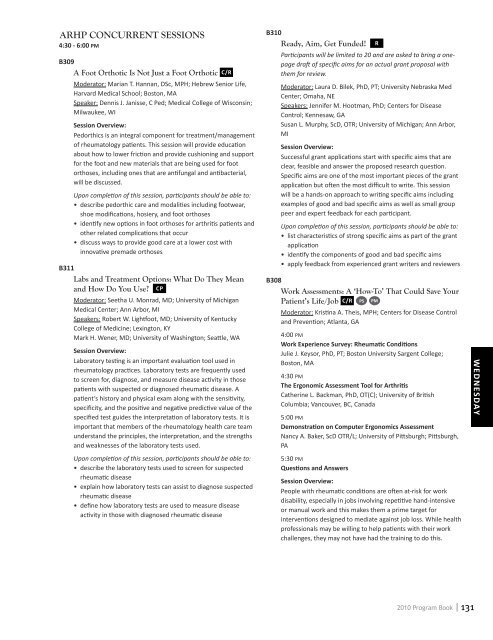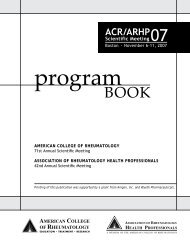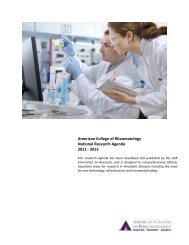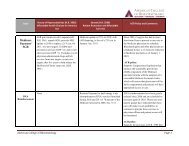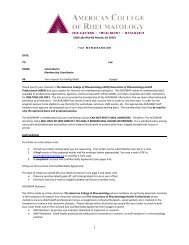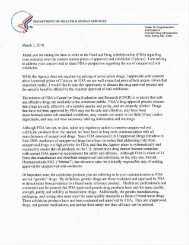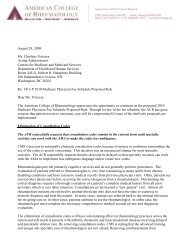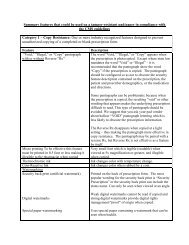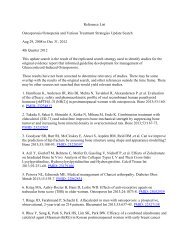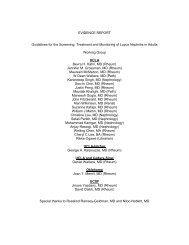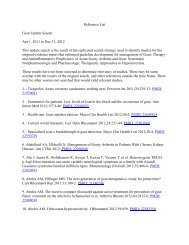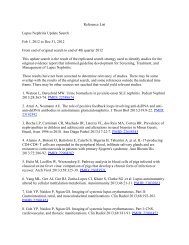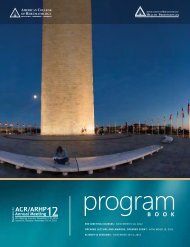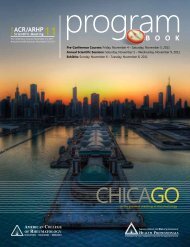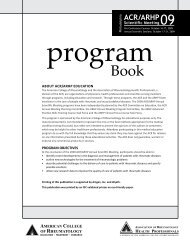B O O K - American College of Rheumatology
B O O K - American College of Rheumatology
B O O K - American College of Rheumatology
You also want an ePaper? Increase the reach of your titles
YUMPU automatically turns print PDFs into web optimized ePapers that Google loves.
ARHP Concurrent Sessions<br />
4:30 - 6:00 PM<br />
B309<br />
A Foot Orthotic Is Not Just a Foot Orthotic c/r<br />
Moderator: Marian T. Hannan, DSc, MPH; Hebrew Senior Life,<br />
Harvard Medical School; Boston, MA<br />
Speaker: Dennis J. Janisse, C Ped; Medical <strong>College</strong> <strong>of</strong> Wisconsin;<br />
Milwaukee, WI<br />
Session Overview:<br />
Pedorthics is an integral component for treatment/management<br />
<strong>of</strong> rheumatology patients. This session will provide education<br />
about how to lower friction and provide cushioning and support<br />
for the foot and new materials that are being used for foot<br />
orthoses, including ones that are antifungal and antibacterial,<br />
will be discussed.<br />
Upon completion <strong>of</strong> this session, participants should be able to:<br />
• describe pedorthic care and modalities including footwear,<br />
shoe modifications, hosiery, and foot orthoses<br />
• identify new options in foot orthoses for arthritis patients and<br />
other related complications that occur<br />
• discuss ways to provide good care at a lower cost with<br />
innovative premade orthoses<br />
B311<br />
Labs and Treatment Options: What Do They Mean<br />
and How Do You Use? cP<br />
Moderator: Seetha U. Monrad, MD; University <strong>of</strong> Michigan<br />
Medical Center; Ann Arbor, MI<br />
Speakers: Robert W. Lightfoot, MD; University <strong>of</strong> Kentucky<br />
<strong>College</strong> <strong>of</strong> Medicine; Lexington, KY<br />
Mark H. Wener, MD; University <strong>of</strong> Washington; Seattle, WA<br />
Session Overview:<br />
Laboratory testing is an important evaluation tool used in<br />
rheumatology practices. Laboratory tests are frequently used<br />
to screen for, diagnose, and measure disease activity in those<br />
patients with suspected or diagnosed rheumatic disease. A<br />
patient’s history and physical exam along with the sensitivity,<br />
specificity, and the positive and negative predictive value <strong>of</strong> the<br />
specified test guides the interpretation <strong>of</strong> laboratory tests. It is<br />
important that members <strong>of</strong> the rheumatology health care team<br />
understand the principles, the interpretation, and the strengths<br />
and weaknesses <strong>of</strong> the laboratory tests used.<br />
Upon completion <strong>of</strong> this session, participants should be able to:<br />
• describe the laboratory tests used to screen for suspected<br />
rheumatic disease<br />
• explain how laboratory tests can assist to diagnose suspected<br />
rheumatic disease<br />
• define how laboratory tests are used to measure disease<br />
activity in those with diagnosed rheumatic disease<br />
B310<br />
Ready, Aim, Get Funded! R<br />
Participants will be limited to 20 and are asked to bring a onepage<br />
draft <strong>of</strong> specific aims for an actual grant proposal with<br />
them for review.<br />
Moderator: Laura D. Bilek, PhD, PT; University Nebraska Med<br />
Center; Omaha, NE<br />
Speakers: Jennifer M. Hootman, PhD; Centers for Disease<br />
Control; Kennesaw, GA<br />
Susan L. Murphy, ScD, OTR; University <strong>of</strong> Michigan; Ann Arbor,<br />
MI<br />
Session Overview:<br />
Successful grant applications start with specific aims that are<br />
clear, feasible and answer the proposed research question.<br />
Specific aims are one <strong>of</strong> the most important pieces <strong>of</strong> the grant<br />
application but <strong>of</strong>ten the most difficult to write. This session<br />
will be a hands-on approach to writing specific aims including<br />
examples <strong>of</strong> good and bad specific aims as well as small group<br />
peer and expert feedback for each participant.<br />
Upon completion <strong>of</strong> this session, participants should be able to:<br />
• list characteristics <strong>of</strong> strong specific aims as part <strong>of</strong> the grant<br />
application<br />
• identify the components <strong>of</strong> good and bad specific aims<br />
• apply feedback from experienced grant writers and reviewers<br />
B308<br />
Work Assessments: A ‘How-To’ That Could Save Your<br />
Patient’s Life/Job c/r PS PM<br />
Moderator: Kristina A. Theis, MPH; Centers for Disease Control<br />
and Prevention; Atlanta, GA<br />
4:00 PM<br />
Work Experience Survey: Rheumatic Conditions<br />
Julie J. Keysor, PhD, PT; Boston University Sargent <strong>College</strong>;<br />
Boston, MA<br />
4:30 PM<br />
The Ergonomic Assessment Tool for Arthritis<br />
Catherine L. Backman, PhD, OT(C); University <strong>of</strong> British<br />
Columbia; Vancouver, BC, Canada<br />
5:00 PM<br />
Demonstration on Computer Ergonomics Assessment<br />
Nancy A. Baker, ScD OTR/L; University <strong>of</strong> Pittsburgh; Pittsburgh,<br />
PA<br />
5:30 PM<br />
Questions and Answers<br />
Session Overview:<br />
People with rheumatic conditions are <strong>of</strong>ten at-risk for work<br />
disability, especially in jobs involving repetitive hand-intensive<br />
or manual work and this makes them a prime target for<br />
interventions designed to mediate against job loss. While health<br />
pr<strong>of</strong>essionals may be willing to help patients with their work<br />
challenges, they may not have had the training to do this.<br />
wednesday<br />
2010 Program Book 131


